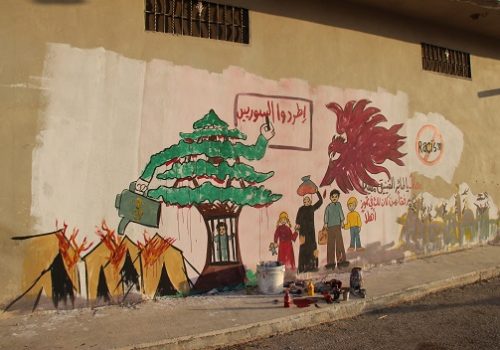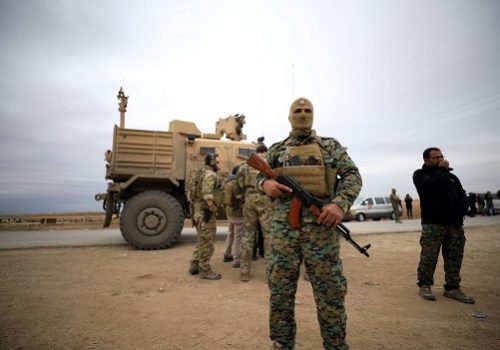Will nine years of war and deteriorating governance spark a new movement inside Syria?
“Syria is for us, not for Assad’s family. Long live Syria! Down with Bashar al-Assad,” many Syrians chanted in 2011, as demonstrations bloomed across the country. Protesters wanted to emphasize separating Syria from Assad’s family, which has been ruling the country with an iron fist for fifty years. Syrians took to the streets to accomplish this goal but were met with guns and violence.
This past June—over nine years since the 2011 protests started—the same slogan reappeared in demonstrations in Suweida, southern Syria, when hundreds of people took to the streets to express their anger toward the deteriorating economic situation and the government’s failure to manage it. In the past few months, the Syrian pound hit 2,000 pounds to the US dollar on the black market—a record low after it was once 47 pounds to the US dollar before the 2011 protests started. Today, the average monthly salary does not exceed $50, around 85 percent of the population is living in poverty, prices continue to skyrocket, the unemployment rate is at least 50 percent, and international sanctions are exacerbating the economic situation.
During the Suweida protests, which lasted for several weeks over the course of two waves this summer, the same dream seemed present: for Syria to belong to its citizens rather than the ruling family and the corrupt elites who are now controlling much of the country’s economy. In parallel with those demonstrations, which some saw as the beginning of a new revolution in the war-torn country, I started hearing some whispers in Damascus and many other cities, discussing the same idea expressed in the chant: “This country is not ours anymore. Syria has become ‘theirs,’ which is something we cannot accept.” However, “theirs” now refers to war profiteers and the notorious Syrian mukhabarat or intelligence apparatus. What is remarkable is that those very whispers are now voiced by regime loyalists.
So, what has changed now? Is a new movement inside Syria’s regime-controlled areas about to start? What would mobilize people to act and change the status quo? And how would that be different from what happened over a decade ago?
Core regime supporters voice their discontent
In 2011, different segments of Syrian society engaged in the movement: intellectuals, students, workers, farmers, unemployed, etc. Some wanted to improve their situations, others sought political or social goals, while many dreamed of change at large. Those people who led the call for change by starting the revolution have either died, disappeared, or have fled the country, with over half a million dead and millions displaced in total. Those who are still in Syria today, specifically in regime-controlled areas, live in fear after paying a huge price for defying the regime. Many were detained, others were forced from their homes, and almost everyone has lost someone dear and is now living under dire economic circumstances. Those Syrians who are thinking about rising up today are different than those who lit the revolutionary torch in 2011.
A 40-year-old man who lives in Damascus and owns a big grocery store recently told me, “If people went out to the streets, I would go demonstrate with them. The situation is intolerable.” Despite being a staunch Assad loyalist, he is frustrated with certain widespread practices perpetrated by shabiha, thugs connected to the regime, or by government administrations. He is specifically angry at the Ministry of Internal Trade and Consumer Protection, which is responsible for monitoring supplies and handing out fines for storing expired food, selling illegal goods, and so forth. Ministries and state institutions, like the aforementioned, are scouring money from any potential source. The grocery store owner had to pay huge bribes to both customs and the Trade Ministry just to keep his business open. If he had refused, he would have faced false accusations that he is working outside the law—charges such as importing unauthorized goods—and would be forced to close his shop and potentially face time in prison, as has happened to thousands of businessmen and traders in the past months. “Is this our reward for being loyalists?” he wondered.
A friend who works in the technology sector faced such charges even though he had not broken any law or dealt in illicit goods. He had to sell his car just to pay the bribes and keep his private business going. Another private sector employee asked me: “Are we going to reelect Bashar al-Assad next year, even though he led the country to hell?” Her statement represents a complete change in stance—she had happily voted for Assad during the last presidential elections in 2014.
Thousands of Syrians across the country share those thoughts, regardless of their political or ideological affiliation: soldiers who gave everything and got nothing in return; small and medium businessmen and traders whose livelihoods are now threatened; and employees, students, and workers who feel that their lives can turn upside down in a moment by shabiha or intelligence agents. There is a universal feeling that the rule of law no longer exists and that even being loyal to the regime cannot guarantee your safety.
What makes this relevant is that their desperate situation has pushed them past their fears and, thus, they might be willing to act given the right moment and impetus. At this point, many of them have nothing to lose. Syrians have long since given up on the international community and help from neighboring countries is unlikely as they are struggling with their own internal problems. The only feasible way to improve Syria’s situation is to work from within.
Whether civil society can tap into popular discontent remains to be seen
The atmosphere is tense in regime-held areas, but the movement has yet to rekindle. Syrians who want to see change need to tap into shared grievances and goals to unite the community. Almost every Syrian in the current moment is searching for a better life and feels that the onus of improving circumstances—even just one’s own—lies in taking matters into one’s own hands. They do not feel like they can rely on a completely paralyzed government, which is unable to stop the deterioration of the economy and the country, is powerless to uphold the law, and is actively undermining any form of good governance. Activists and community leaders need to focus on these shared grievances and the actions they can take to address them when trying to mobilize Syrians.
The protests in Suweida give hope, but the southern governorate’s situation is different than Damascus. In large part because of its Druze religious leaders, their relations with the Syrian authorities, and their reluctance to enter in direct confrontation with the regime, the city has seen relatively little fighting. Nonetheless, its civil society remains relatively strong. Although Suweida has suffered from arrests and repression like other regime-controlled areas, the influence of Druze leaders and powerful local families has helped limit central government control and even led to a push back against overly oppressive commanders assigned to controlling the governorate. This relative lack of central government oppression is also likely what allowed the Suweida protests to happen in June.
Civil society in regime-controlled areas must be strengthened, rebuilt, and reconfigured so that activists can implement new mobilization techniques that are tailored to new environments and circumstances. The tools used in 2011—such as distributing flyers and general strikes—are already obsolete. The old slogans need to be changed to avoid scaring people into thinking that the 2011 scenario—a brutal, seemingly never-ending war—will be repeated. Even the regime’s strongest supporters are discussing the necessity of fighting corruption and ending the rule of the shabiha and the supremacy of the security sector. This is not a chance to be missed.
Unbearable living conditions and a lack of hope in both the Assad regime and the international community have pushed Syrians to a new level of anger and outrage. It would be a mistake to think that this alone will push people to act after nine years of war and so much loss. However, it would be a bigger mistake to let this opportunity slip without trying to seize it in order to bring positive change to the Syrian people who are so desperately in need of it.
Noura Darwish is a journalist living in Damascus. She is writing under a pseudonym for her safety.
Image: A man walks past a banner depicting Syrian president Bashar al-Assad in Douma, outside Damascus, Syria VIA REUTERS.


